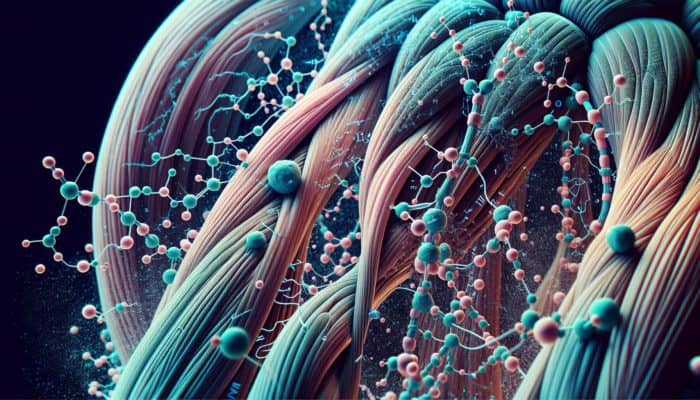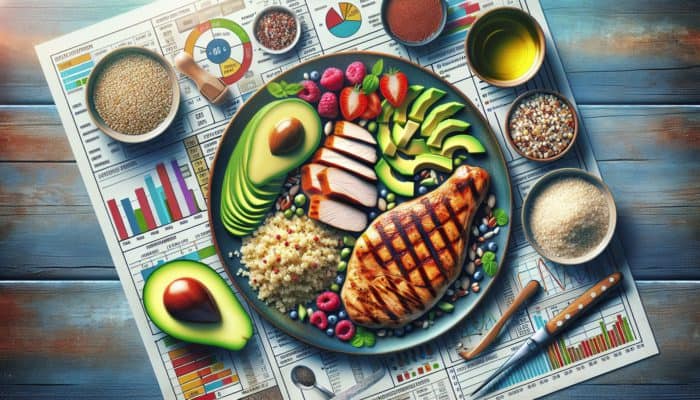Harness the Benefits of Protein for Optimal Muscle Development
Explore How Protein Supports Effective Muscle Repair and Growth

Protein is a crucial element in the complex processes of muscle repair and growth, serving as the vital building block for muscle tissue. After engaging in rigorous workouts, muscle fibres experience micro-tears, and at this critical point, the importance of protein becomes paramount in the recovery and rebuilding of these fibres. This reconstruction process not only boosts muscle mass but also enhances overall strength. The substantial advantages of integrating protein into your muscle-building strategy include:
- Accelerating muscle recovery post strenuous exercise sessions, ensuring you bounce back faster.
- Encouraging increased muscle hypertrophy through effective muscle protein synthesis that promotes growth.
- Enhancing performance in subsequent training sessions, allowing for improved results over time.
- Helping to prevent muscle catabolism during caloric deficits, ensuring your hard-earned gains are maintained.
Incorporating adequate protein into your daily nutrition plan not only aids in recovery but also prepares your body for future workouts. This cyclical benefit guarantees that your muscle gains are sustainable, leading to ongoing improvements in both strength and muscle size. The fundamental role of protein in muscle development is undeniable; it establishes the foundation for muscle growth and enhancement.
Calculate Your Daily Protein Requirements for Optimal Muscle Growth
Determining your daily protein needs is essential for maximising muscle growth and ensuring effective recovery. Several factors, including body weight, activity level, and specific fitness goals, significantly influence the quantity of protein your body requires. Generally, individuals pursuing an active lifestyle focused on increasing lean muscle should aim for a protein intake of between 1.6 to 2.2 grams per kilogram of body weight.
For example, a person weighing 70 kg should target a protein intake of approximately 112 to 154 grams each day. It is vital to consider your unique circumstances; individuals engaged in high-intensity training may need even greater protein levels. Additionally, spreading protein intake evenly throughout the day can optimise its benefits, thereby supporting continual muscle repair and growth.
Discover the Best Protein Sources to Enhance Muscle Gain
When selecting protein sources, prioritising quality is just as vital as quantity. High-quality protein sources provide the essential amino acids necessary for effective muscle repair and growth. It is important to include a diverse range of protein options in your diet to ensure comprehensive nutrient intake. The most effective protein sources for muscle gain include:
- Lean meats such as chicken, turkey, and lean cuts of beef, which are rich in essential nutrients.
- Fish, particularly fatty varieties like salmon and tuna, known for their omega-3 fatty acids that support overall health.
- Eggs, celebrated for their complete amino acid profile and versatility in various meals, making them a top choice.
- Plant-based proteins including legumes (like lentils and beans), tofu, tempeh, and quinoa, which offer excellent nutrition.
Choosing protein sources that suit your dietary preferences and lifestyle can significantly enhance your muscle-building journey. Whether you follow a meat-inclusive or vegetarian diet, a wealth of nutritious options is available worldwide, from vibrant markets in Thailand featuring tofu and legumes to organic farms in Italy providing fresh eggs and poultry.
Proven Strategies for Building Lean Muscle with Protein

Identify the Most Effective Types of Protein for Muscle Growth
Different types of protein can greatly influence muscle-building outcomes. Whey protein, renowned for its rapid absorption, is especially beneficial for post-workout recovery as it quickly delivers essential amino acids to the muscles. In contrast, casein protein digests slowly, providing a sustained release of amino acids, making it ideal for overnight muscle recovery and repair.
Plant-based proteins, sourced from legumes and nuts, can also be highly effective when consumed in adequate amounts. For example, athletes adhering to a vegan diet can combine different protein sources—such as rice and beans—to achieve a complete amino acid profile. Consider your dietary preferences and workout schedule when selecting your protein source; certain scenarios may necessitate a blend of whey and casein or a combination of plant-based proteins to optimise muscle growth.
Enhance Muscle Growth by Timing Your Protein Intake
The timing of your protein consumption can significantly boost muscle protein synthesis, particularly in relation to your workouts. Consuming protein both before and after exercise can improve recovery rates and effectively stimulate muscle growth. Aim to enjoy a protein-rich meal or snack within 30 minutes to two hours following your workout.
Implementing a structured approach can optimise the timing of your protein intake. Here are some actionable strategies to consider:
- Have a protein-rich snack or shake immediately after your workout to kickstart recovery.
- Plan meals that include protein both before and after training sessions to continually support muscle health.
- Incorporate protein into your breakfast to initiate muscle recovery early in the day, setting a positive tone.
- Adjust protein intake prior to bedtime to support overnight muscle repair and growth.
By strategically timing your protein intake, you can maximise recovery and muscle growth, ensuring that every workout contributes positively to your overall fitness objectives.
Combine Protein with Other Nutrients for Optimal Muscle Growth

Achieving optimal muscle growth demands more than just protein; it’s essential to pair it with carbohydrates and healthy fats, which are crucial for effective recovery and overall nutrition. Carbohydrates replenish depleted glycogen stores from workouts, while fats play a vital role in hormone production necessary for muscle growth.
Finding the right balance in your meals can significantly enhance your muscle-building efforts. For instance, aim to include a combination of protein-rich foods, complex carbohydrates, and healthy fats. A post-workout meal might consist of grilled chicken (protein), quinoa (carbohydrate), and avocado (healthy fat), creating a nutrient-dense plate. Strive to prepare meals that are not only rich in protein but also well-rounded, as this will enhance recovery and muscle growth.
Understanding the Role of Protein in Lean Muscle Development
Explore the Mechanisms Behind Protein’s Role in Muscle Synthesis
Protein is indispensable for muscle synthesis as it provides amino acids, the foundational building blocks of muscle tissue. Upon consumption, protein is broken down into amino acids that are critical for muscle protein synthesis (MPS)—the process responsible for repairing and constructing new muscle tissue. This cycle is vital for individuals aiming to enhance their lean muscle mass, as it emphasises key aspects of muscle recovery and growth.
Understanding the mechanisms governing protein’s role in muscle synthesis can empower individuals to fine-tune their dietary choices. The stimulation of MPS occurs in response to resistance training combined with sufficient protein intake, which together promote muscle adaptation and hypertrophy. By ensuring a robust protein supply, you create a favourable balance between muscle protein synthesis and breakdown, essential for effective muscle growth.
Assessing the Impact of Protein Quality on Muscle Development
The quality of protein consumed is a significant factor in muscle development. High-quality proteins, commonly referred to as complete proteins, contain all nine essential amino acids required for muscle repair and growth. Typically, animal-based proteins such as meat, fish, and dairy are considered complete, while many plant-based proteins may be deficient in one or more essential amino acids.
To optimise muscle-building efforts, it is crucial to prioritise high-quality protein sources. For instance, combining various plant proteins can create a complete amino acid profile, facilitating effective muscle development. By recognising the importance of protein quality, individuals can make informed dietary choices that effectively support their fitness objectives.
Utilising Protein to Prevent Muscle Breakdown
Consuming adequate protein is essential for preventing muscle catabolism, especially during periods of caloric deficit or intense training. Muscle breakdown can occur when the body lacks the necessary nutrients to sustain physical activity, leading to a reduction in lean muscle mass.
By ensuring sufficient protein intake, individuals can safeguard against muscle catabolism and promote an anabolic state conducive to growth. Protein not only aids in recovery but also provides the necessary substrates for maintaining muscle tissue. Regularly incorporating protein-rich foods into your diet can help protect against muscle loss, ensuring your hard-earned gains remain intact.
Implementing Effective Strategies for Protein Incorporation Into Your Diet
Strategically Planning Meals for High Protein Intake
To realise your muscle-building objectives, careful meal planning is vital to ensure you meet your daily protein requirements. Creating a high-protein meal plan involves selecting appropriate foods and balancing them with other essential nutrients. Here are some meal planning strategies to help you maintain a high-protein diet:
- Include a source of protein in every meal, such as eggs for breakfast or chicken for lunch to maintain a steady intake.
- Prepare high-protein snacks, like Greek yogurt or protein bars, for convenient nutrition on the go.
- Batch-cook protein-rich meals for easy access throughout the week, simplifying your meal prep.
- Experiment with different protein sources to keep meals interesting and diverse, preventing dietary monotony.
Strategically planning your meals not only helps you achieve your protein goals but also supports overall dietary balance. Consider integrating local culinary traditions that focus on protein-rich foods into your diet, allowing for seamless incorporation and enjoyment.
Maximising Protein Supplement Usage Effectively
Protein supplements can be a valuable addition to your diet, particularly if you’re struggling to meet your protein needs through whole foods alone. Supplements, such as whey protein powder or plant-based protein blends, can help bridge the gap between your protein requirements and actual intake.
To utilise protein supplements effectively, consider your fitness objectives. If your goal is muscle gain, choose a supplement with a higher protein concentration to meet your needs. If maintenance is your focus, a more balanced approach may be more suitable. Additionally, timing your supplement intake—such as immediately after workouts—can enhance its effectiveness, facilitating muscle recovery and growth.
Best Practices for Distributing Protein Intake Throughout the Day
Evenly distributing protein intake throughout the day is a strategy that can optimise muscle protein synthesis. Rather than consuming a large amount of protein in a single meal, aim for consistent protein intake at each meal and snack throughout your day.
Research indicates that consuming 20-30 grams of protein per meal can effectively stimulate muscle protein synthesis, making it easier to achieve your total daily protein targets. For instance, a daily eating schedule could include 30 grams of protein at breakfast, lunch, and dinner, supplemented with protein-rich snacks throughout the day. This balanced approach supports muscle growth while helping to maintain energy levels and promote overall well-being.
Selecting High-Quality Protein Sources for Optimal Muscle Building
Choosing high-quality protein sources is critical for optimal nutrition and health benefits. Focus on incorporating a diverse array of protein-rich foods into your diet. Lean meats, fish, eggs, and dairy products represent excellent protein sources, while plant-based options such as legumes, tofu, and quinoa also provide essential amino acids necessary for muscle development.
Prioritising quality over quantity can significantly influence your muscle-building journey. For instance, opting for wild-caught fish can offer additional nutrients such as omega-3 fatty acids, which are beneficial for reducing inflammation and promoting recovery. By making informed choices about your protein sources, you can enhance your overall health while effectively supporting muscle development.
Adjusting Protein Intake Across Different Life Stages
As we progress through various life stages, our protein requirements evolve. Whether due to growth spurts in adolescence, the demands of pregnancy, aging, or rigorous athletic training, understanding these changes can help you adjust your protein consumption for optimal health and performance.
For example, adolescents may require higher protein intake to support their growth, while older adults often need increased protein to combat age-related muscle loss. Similarly, pregnant women typically need additional protein for fetal development. By adjusting your protein intake according to these life stages, you can ensure your body receives the necessary support, ultimately contributing to lasting health and vitality.
Explore the Advantages of Building Lean Muscle Through Protein
Experience Enhanced Physical Performance and Strength
Building lean muscle through adequate protein intake can significantly elevate your physical performance and overall strength. An increase in muscle mass translates to improved power output, endurance, and athletic capability. Whether you are a competitive athlete or someone involved in recreational fitness, lean muscle provides the strength necessary for daily activities and sports, enhancing your quality of life.
Moreover, as strength increases, so does confidence, which encourages greater participation in physical activities. This positive feedback loop fosters a commitment to fitness, essential for maintaining a healthy lifestyle. As you grow stronger, you’ll find that daily tasks become less challenging, contributing to an enhanced quality of life and overall well-being.
Boost Your Body Composition and Metabolism
Lean muscle mass plays a pivotal role in improving both body composition and metabolic rate. Increased muscle mass results in a higher basal metabolic rate (BMR), meaning your body burns more calories even at rest. This metabolic boost aids in weight management and fat loss, making it easier to maintain a healthy weight without excessive effort.
Furthermore, the thermic effect of protein—where the body expends energy digesting and metabolising protein—supports effective weight management. By focusing on building lean muscle through adequate protein intake, you establish a sustainable approach to achieving and maintaining your desired body composition, ultimately enhancing your overall health and fitness.
Discover Long-Term Health Benefits Associated with Muscle Mass
Maintaining lean muscle mass offers numerous long-term health advantages. Research indicates that increased muscle mass correlates with better bone health, reduced injury risk, and enhanced longevity. Muscle mass supports your skeletal structure, acting as a protective barrier against conditions like osteoporosis and fractures, which can significantly impact quality of life.
Moreover, a higher muscle mass can improve insulin sensitivity, lowering the risk of chronic diseases such as type 2 diabetes. By prioritising protein for muscle growth, you not only cultivate immediate fitness benefits but also lay the groundwork for long-term health and well-being, ensuring a healthier future.
Accelerate Recovery and Lower Injury Risk
The significance of protein in muscle repair and growth cannot be overstated. Adequate protein intake speeds up recovery time and diminishes injury risks, which is crucial for maintaining consistent training and performance. Protein plays a vital role in repairing micro-tears incurred during workouts, ensuring that you recover stronger and are ready for your next session.
Moreover, a well-nourished body is better equipped to handle the demands of intense training. By integrating protein-rich foods into your diet, you can help shield against injuries, allowing you to train consistently and achieve your fitness aspirations with greater success.
Research-Based Insights into the Benefits of Building Lean Muscle Through Protein
How Does Protein Intake Impact Muscle Recovery?
Protein intake is a critical component of muscle recovery, as it supplies the body with essential amino acids required for repairing and rebuilding muscle tissue. Studies indicate that individuals consuming adequate protein after exercise experience quicker recovery times compared to those with insufficient intake, promoting overall performance.
Recovery encompasses more than just repairing damaged muscle fibres; sufficient protein intake also aids in replenishing energy stores and minimising muscle soreness. This aspect is particularly vital for athletes and fitness enthusiasts, as effective recovery enables a greater capacity to train rigorously and enhance performance over time.
What Role Does Protein Play in Muscle Hypertrophy?
Protein is foundational for muscle hypertrophy, which refers to the increase in muscle size. Research indicates that higher protein intake correlates with greater muscle growth in response to resistance training. Consuming approximately 1.6 to 2.2 grams of protein per kilogram of body weight has been shown to maximise hypertrophic responses, facilitating effective muscle development.
The anabolic effects of protein contribute to stimulating muscle protein synthesis, thus promoting muscle growth. For those serious about building lean muscle, prioritising protein intake within this range is essential for achieving optimal results and success in your fitness journey.
What Does Science Reveal About Protein’s Role in Muscle Maintenance?
Maintaining muscle mass is crucial for both aesthetic and health-related purposes. Scientific evidence highlights the importance of consistent protein intake in preserving muscle tissue, particularly as individuals age. The natural decline in muscle mass, known as sarcopenia, can lead to decreased strength and functionality over time.
By ensuring adequate protein consumption, older adults can counteract this decline and sustain their quality of life. Regularly including protein-rich meals throughout the day can be a key strategy in preserving muscle mass and promoting overall health as we age, ensuring vitality and well-being.
Dispelling Common Misconceptions About Protein and Muscle Building
Clarifying the Myth of Excessive Protein Intake
A prevalent misconception surrounding protein consumption is that excessive protein automatically leads to muscle gain or could result in negative health effects, such as kidney damage. In reality, the body requires a balanced intake of nutrients. While considerable debate exists regarding optimal protein levels, it’s crucial to recognise that the body can effectively process substantial amounts of protein when balanced with other essential nutrients.
Moderation and balance are vital; consuming protein beyond your body’s requirements may not yield additional benefits and can lead to unnecessary caloric intake. Focusing on overall dietary balance will be more advantageous than fixating on any single macronutrient, promoting a well-rounded approach to nutrition.
Understanding the Truth About Protein Timing and Muscle Building
Although protein timing has garnered considerable attention, it is not as critical as the total amount of protein consumed daily. While consuming protein around workouts can be beneficial, the overall protein intake throughout the day is what truly matters for muscle growth and development. Prioritising a consistent and adequate protein intake remains the most effective strategy to promote muscle growth.
Evaluate your daily routine and identify opportunities to integrate protein into your meals and snacks, ensuring that your total intake aligns with your fitness aspirations and goals.
Can Plant-Based Protein Match the Effectiveness of Animal-Based Protein?
Plant-based protein can indeed be as effective for muscle building as animal-based protein, provided it is consumed in sufficient quantities and variety. Many plant-based proteins, derived from legumes, nuts, and seeds, can deliver the essential amino acids necessary for muscle synthesis and development.
By thoughtfully combining plant proteins—such as rice and beans or lentils and quinoa—you can achieve a complete amino acid profile, offering the same muscle-building advantages as animal-based proteins. Regardless of whether you choose a plant-based or animal-based diet, the critical factor is ensuring your protein intake meets your individual requirements for muscle growth and health.
Practical Strategies for Increasing Protein Intake for Muscle Growth
Simple Ways to Elevate Your Daily Protein Intake
Incorporating more protein into your daily diet can be both straightforward and enjoyable. Here are some practical tips to effectively increase your protein intake:
- Add Greek yogurt or cottage cheese to your breakfast or enjoy them as a healthy snack for extra protein.
- Include a protein source in every meal, such as chicken, fish, or tofu, to ensure a consistent intake throughout the day.
- Mix protein powder into smoothies or oatmeal for an easy way to enhance your protein intake without added effort.
- Opt for high-protein snacks, like nuts, jerky, or protein bars, to keep you satisfied and energised throughout the day.
By implementing these straightforward strategies into your daily routine, you can easily increase your protein intake without feeling overwhelmed or restricted, making your dietary goals more achievable.
Balancing Protein with Other Macronutrients for Optimal Health
To support overall health and muscle growth, it is essential to balance protein intake with carbohydrates and fats. Each macronutrient serves a unique function in the body; carbohydrates provide energy, while healthy fats support hormone production and nutrient absorption critical for recovery.
Work to create meals that incorporate all three macronutrients. For example, a meal consisting of grilled salmon (protein), quinoa (carbohydrate), and sautéed vegetables (fibre and nutrients) ensures a well-rounded nutritional profile. By focusing on balance, you can foster muscle growth while maintaining overall health and wellness.
Adjusting Protein Intake Based on Your Fitness Goals
Customising your protein intake according to your specific fitness objectives is vital for success. Individuals aiming to gain muscle may need to increase their protein intake significantly to support muscle hypertrophy, while those focused on maintenance may require slightly less to sustain their current state.
Regularly reassessing your protein needs based on training intensity and personal goals will help optimise your dietary strategy. Consider keeping a food diary to monitor protein intake and make necessary adjustments as your objectives evolve, ensuring continual progress.
Timing Your Protein Intake for Optimal Muscle Recovery
Maximising muscle recovery hinges on the timing of your protein consumption. Consuming protein shortly after workouts can help replenish the amino acids needed for repair and growth, facilitating optimal recovery. Aim for a protein-rich post-workout meal or snack within 30 minutes to two hours after exercising to maximise benefits.
Furthermore, consider incorporating protein before bedtime to support overnight recovery. This strategy can be particularly beneficial for individuals engaged in intense training regimens, ensuring your body remains in an anabolic state even during rest, which is critical for muscle development.
Selecting High-Quality Protein Sources for Muscle Building
High-quality protein sources are integral to effective muscle building and overall health. Focus on choosing lean meats, fish, eggs, and dairy products as reliable protein sources. Plant-based proteins, such as beans, lentils, and tofu, also offer excellent alternatives for individuals following vegetarian or vegan diets, providing essential nutrients for muscle growth.
Emphasising quality over quantity is crucial for maximising muscle synthesis. Aim to diversify your protein sources to ensure comprehensive nutrient intake that supports overall health and performance. Incorporating local foods rich in protein can enhance your diet while honouring cultural culinary practices, making your meals both nutritious and enjoyable.
Frequently Asked Questions About Protein and Muscle Growth
What is the optimal protein intake for effective muscle building?
To optimise muscle building, aim for 1.6 to 2.2 grams of protein per kilogram of body weight daily, adjusting based on your activity level and specific goals to ensure adequate intake.
Is protein powder necessary for muscle growth?
Protein powder is not essential but can be a convenient way to meet protein needs, particularly if whole food sources are insufficient or challenging to access.
Can I effectively build muscle on a plant-based diet?
Yes, building muscle on a plant-based diet is feasible by consuming a variety of protein sources to ensure you acquire all essential amino acids necessary for muscle synthesis.
What is the ideal time to take protein supplements?
Take protein supplements post-workout to facilitate recovery, but you can also consume them throughout the day to meet overall protein goals effectively.
How can I determine if I’m consuming enough protein?
Keeping a food diary and tracking your protein intake can help you assess whether you’re meeting your daily requirements for muscle growth and overall health.
Is it possible to consume too much protein?
Excessive protein intake may not lead to muscle gain and can contribute to unnecessary caloric intake; thus, balance remains essential for optimal nutrition.
What are the optimal protein sources for vegetarians?
Vegetarians can meet their protein needs by incorporating sources such as legumes, tofu, tempeh, quinoa, seitan, and dairy products into their diet to ensure adequate intake.
Does the timing of protein intake truly matter for muscle growth?
While timing protein intake around workouts can be beneficial, total daily intake is more crucial for effective muscle growth and development.
Can a high-protein intake harm my kidneys?
For healthy individuals, a high protein intake is generally safe. However, those with preexisting kidney conditions should consult a healthcare professional to ensure proper management.
What role does protein play in weight management?
Protein supports weight management by increasing feelings of fullness, boosting metabolism, and preserving lean muscle mass during weight loss, making it a valuable nutrient in dietary strategies.
Connect with us on Facebook!
The Article Building Lean Muscle With Protein: A Comprehensive Guide appeared first on https://athleticsupplement.com
The Article Building Lean Muscle: Your Essential Protein Guide Was Found On https://limitsofstrategy.com
References:
https://cityaccommodations.com.au/protein-guide-for-building-lean-muscle-effectively/


